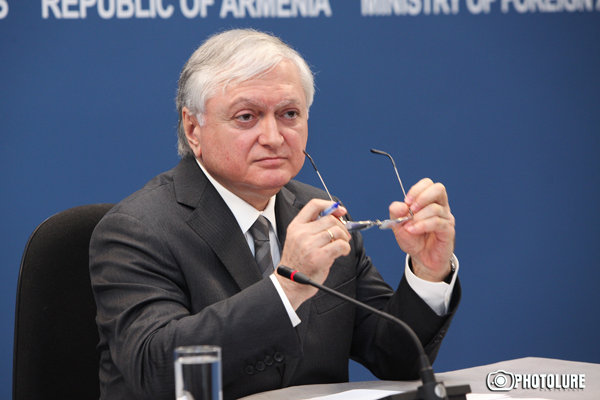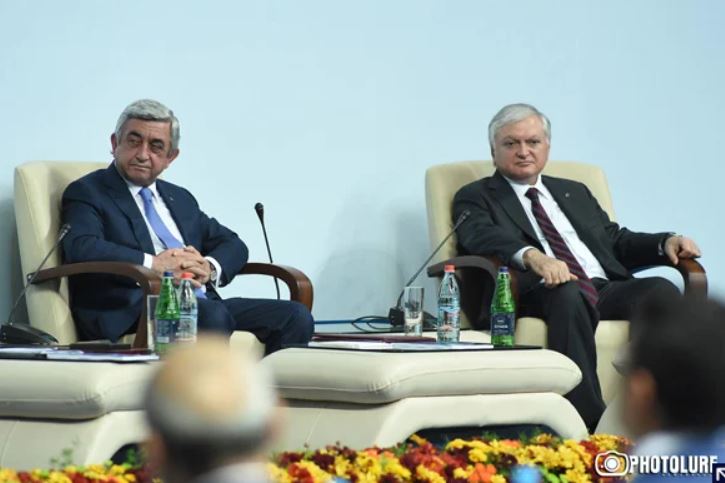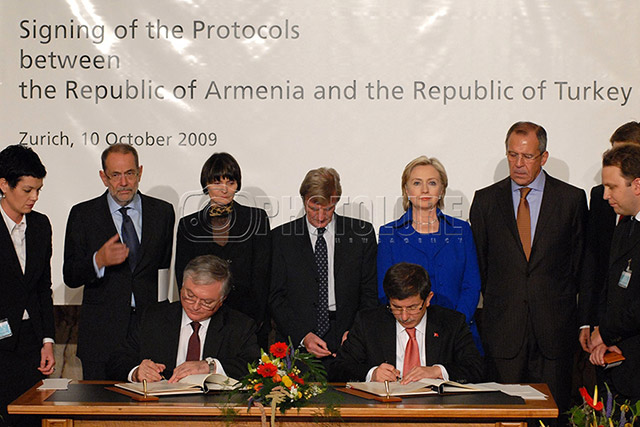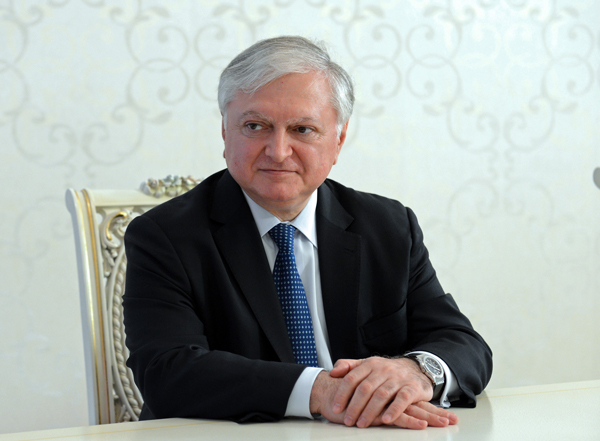Gevorg Altunyan: Good evening, Mr. Minister. Thank you for accepting our invitation to be the guest of the programme. Let us start perhaps from the most important issue, why do you think it all has started?
Edward Nalbandian: Good evening. I think that main explanation is that Azerbaijan failed in the negotiation process. After the failure in military field, Azerbaijan tried to succeed through negotiations and failed again.
In general, I do not like to speak about successes or diplomatic failures; however there are landmark cases, when things should be presented openly.
What is it if not a failure when the entire international community, and the Co-Chair countries representing it, speak about the well-known 3 principles of non-use of force or threat of use of force, equal rights and self-determination of peoples and territorial integrity, while Azerbaijan speaks only about one principle? The Co-Chairs were here recently, few days ago, and during the press-conference they once again reaffirmed those three principles as the basis for the negotiation process and settlement of the issue, and the next day all the headlines of the Azerbaijani media read that the Co-Chairs support the principle of territorial integrity as the basis for negotiations and settlement of the issue. Is that a success for Azerbaijan? Definitely, not.
Read also
Is it a success for Azerbaijan, when they by all means avoid making any reference to or recall the five statements made on the level of the heads of the Co-Chairs countries, which are key documents for the settlement of the issue adopted on Presidential level? Eastern Partnership Summit in Riga is a vivid example, when Azerbaijan’s president rejected to attend and the Foreign Minister left the Summit, as the Declaration referred to those five statements, made by the heads of the Co-Chair states as a basis for the settlement of the issue.
What is it if not a failure, when the Co-Chairs outline that a mechanism for investigation of incidents should be created, which could serve not only to investigation purposes, but also that of restraint? This proposal has been voiced not only by the Co-Chairs but also the United Nations, the European Union, different international institutions, although Azerbaijan pretends that there is not such a thing.
Indeed, there is also criticism against the Co-Chairs, that they do not always make addressed statements, but I would like to remind that last year they made 3 very clear statements addressed to Azerbaijan, where they called to reaffirm commitment for exclusively peaceful settlement of the issue. Azerbaijan never heeded to these calls. The Co-Chairs urged to agree – as Armenia and Artsakh did – to create a mechanism for investigation of incidents. And again, Azerbaijan did not agree. They urged to put an end to the criticism of the Co-Chairs, as they spoke about the lack of political will in that country for the settlement of the issue and so on. This list can go on.
What if not a failure, when in Kazan, in fact, they backtracked from the almost reached agreement? What if not a failure, when before Kazan in Sochi, before Sochi in Astrakhan, before Astrakhan in St. Petersburg they backtracked in the same way? Or 10 years before Kazan in Paris, the so-called “Paris Principles”, when it seemed that the sides were able to reach some agreement and Azerbaijan backtracked in Key West. So on and so forth.
The best prove is when being caught in a situation when they have nothing else to say during the negotiations, in a situation, when they had to decline meeting with the Co-Chairs, an example of which is when the Azerbaijani side rejected to meet the Co-Chairs at all in Washington.
Over the years, Azerbaijan voiced provocations, over the years everyone called to respect the 1994 Trilateral Ceasefire Agreement, which has no time limitations, and 1995 Agreement on the Consolidation of the Ceasefire Regime. In spite of it Azerbaijan pretended as if this was of no concern to it. And now it resorted to large-scale actions. I think that everyone is aware of who launched the actions. All in all, during the talks that I held with my counterparts no one had even the least doubt that it was Azerbaijan, which started those actions.
And, second, its goal is clear – they have told on numerous occasions – to resolve the issue through military means. And they failed again. Azerbaijan may have minimum and maximum goals set. I think that Azerbaijan has not reached neither minimum nor maximum goals. And now it would be forced to return to the negotiation process, sit around the negotiation table and continue talks. It is not an easy task to resume negotiations for sure, appropriate conditions are to be created and the efforts of the Co-Chairs are exerted in this direction.
Gevorg Altunyan: Mr. Minister, I do realize the essence of diplomacy, that we are not always allowed or should speak about all the things that are underway in the negotiation process. Nevertheless, as you have mentioned, the guns are silent now. The issue has shifted into the diplomatic field. And what does Armenia and the Ministry of Foreign Affairs implement in this direction? The question is important, as there are some claims in the society that there is a lack of information on those activities.
Edward Nalbandian: You are probably quite right. Diplomacy is not a field, where all the things should be publicly spoken about. But, referring to the latest developments, I believe, that only during the past week, once you look up the website of the MFA, you would find at least 10 press-releases on these events, developments. From the very first minutes of those developments, Azerbaijan’s aggressive actions, I was in direct contact with my colleagues from the Co-Chair countries and their Ambassadors, I had not one but numerous phone conversations, including with the Minister of Foreign Affairs of the OSCE chairing country, and also Ministers of Foreign Affairs of our neighbouring countries, Secretary Generals, heads of different institutions. It is obvious that all those institutions and many states reacted and unequivocally declared that there is no alternative to exclusively peaceful settlement of the issue, and criticized the resumption of military actions.
Those phone conversations, meetings continue to this day. Some other developments took place yesterday, which, as you mentioned, should not be publicized, but even yesterday at night and today in the early morning I had nearly 12 phone conversations with my colleagues and representatives of different institutions. Making speeches is not what is crucial in diplomacy, hanging bells is – in order to reach results, as if meetings of the Foreign Minister, Ambassadors accredited to other states, or other MFA high-ranking officials are publicized, it may become a target for the adversary, or those who would use that for opposite goals.
Gevorg Altunyan: Mr. Minister, after the resumption of military actions, during the first two days, apparent inertia could be observed in international reaction, and there was the impression as if the world is waiting to see how the developments would unfold in the battlefield, and only then, roughly speaking, interfere in the process. Is this impression correct, and what is your comment on that?
Edward Nalbandian: A situation was created when it was repeatedly said that Azerbaijan is to wage war, Azerbaijan is to use force, Azerbaijan threatens, Azerbaijan triggers provocations and they happened, but not that kind of large-scale actions…
Gevorg Altunyan: In other words, they got used to it and did not expect…
Edward Nalbandian: Not got used to it, but lots of people thought, that there would be new provocations, and so on and so forth, but not everyone would expect it to be to that extent, to that scale.
Indeed, analyses was needed as soon as the first information was received, as there was an information received from one side, and the other side was also to be heard, one should have alternative information. And statements and conclusions are made only by comparing it all. But I think, that the statements followed quite soon.
I am not speaking about our statement, as the Ministry of Foreign Affairs made its statement on the developments hours later. Statements by the Co-Chair countries were also made, those by the international institutions were voiced.
I do not think, we could label it as a sign of inertia. There is a deep concern, and those institutions and the Co-Chairs attentively follow the events, exert efforts for the situation not only not to further destabilize but the opposite, so that respective conditions are created to continue the negotiations.
Gevorg Altunyan: The Foreign Minister of Azerbaijan stated that he learned about the resumption of military actions from the third party. How likely is all that?
Edward Nalbandian: You know, it is not the first time, when a high-ranking Azerbaijani official stated that they were not aware. The left hand does not know what the right hand is doing. Or pretend they were not aware. It is not the first time when the supreme leadership creates an impression, that they were on a plane, I do not know where else, and someone decided, carried out some actions, organized provocations…
It is not the first time. We, in Armenia, are well acquainted with that. But what you point out, I am not sure whether it is this way or the other, but in reality, only after my calls those interlocutors started contacting him. At first he was not picking up the phone. It was rather difficult to contact him. Then he pretended that he is not quite aware. Hence, one could leave conclusion to the interlocutors to say to what extent do they believe in the expressions of such kind and style, when in those rather critical conditions the Azerbaijanis pretend as if nothing happened.
Gevorg Altunyan: I see. One thing was remarkable in the developments of recent days, regarding the states considered as our partner-states. Obviously, you are aware, that some statements were made from those countries, which, to say the least, were not pro-Armenian or even neutral. Apparently, some pro-Azerbaijani essence could be noticed in them. How would you comment on that?
Edward Nalbandian: If you mean the member-states of the Eurasian Economic Union (EAEU), one should not exaggerate in that regard, as even when you take into consideration the countries of the European Union, not always the EU member-states agree with each other. They make statements or voice positions which do not necessarily please all the member-states always.
As to the EAEU, it is a newly established structure. I drew parallel with the European Union, but one may make comparison with other structures. This is an economic union, and each state has their intentions here, directions, interests, preferences, etc.,and may voice respective opinions. We don’t have such format within the CSTO, where foreign policy positions could be coordinated, as is the case in the Collective Security Treaty Organization (CSTO).
But even in the CSTO such things happen. Indeed, this is the reason why we always raised this issue from Summit to Summit, from Ministerial meeting to Ministerial meeting, and not only us, but also the Secretariat, and other countries as well. Indeed, much coordinated and effective work should be done in this direction and cooperation and partnership should be established between the states. A Ministerial Meeting of the CSTO is scheduled here soon. I think, this issue would be raised again.
Gevorg Altunyan: Statements were made by high-ranking authorities of our strategic ally Russia, which overtly expose equalization of substance and depth of the relations with Armenia and Azerbaijan. Such an impression was created at least from the level of statements. Obviously this fact should have caused rather huge dissatisfaction in the society. Is this a normal situation?
Edward Nalbandian: It is not in Azerbaijan, where the Russian military base is located, not Azerbaijan that is a CSTO member, not Azerbaijan which, unlike Armenia, has dozens of agreements with Russia on defense and military-industrial sector. Not Azerbaijan signed the well-known “5th Protocol” with Russia, about which I elaborated thoroughly in on of my previous interviews. This list can go on. I do know that it has become a topic of rather sharp criticism in our public opinion, that Azerbaijan purchases respective weaponry from Russia. There is such an approach, an opinion as if it is a matter of business. I do not know, whether to accept that argument or not, but in reality, the Armenian-Russian relations are not business relations, they are strategic not just in words The also have legal foundation. This is clear to all, including Azerbaijan. It is not a secret.
Gevorg Altunyan: Against this backdrop, certain circles of society make demands regarding our membership in the EAEU. This is the logic behind it. Two of our partners – Belarus and Kazakhstan – display unequivocal attitude on recent developments. Russia sells weapons to our adversary. Why then should we stay in this structure? What should we answer these people?
Edward Nalbandian: As I already mentioned, the EAEU is an economic union. This is a structure, where member-states are able to make consensus-based decisions, express their positions. No decision can be made in this institution without the consent of all the states. Armenia enjoys full right to express its opinion, and no decision may be adopted without also our consent. Those states are also CSTO members (thi is completely another story, as I already said) should display more coordinated approach on foreign policy issues.
In particular, if we speak about Nagorno-Karabakh, then the summits and the ministerial councils of the CSTO have issued statements on numerous occasions, made decisions, in which the approaches, position of the CSTO member-states on the settlement of the issue is clearly emphasized. We are talking about the support to the efforts of the Co-Chair countries, exclusively peaceful settlement of the issue based on the well-known three principles, as well as the support to the five statements of the heads of Co-Chair countries.
All these is very clear. If one of those member-states makes a misstep or expresses different positions, then within those frameworks we remind them, that we have common consensus-based approaches adopted on the level of Presidents, and even instructions based on those adopted decisions have been provided to the Ambassadors of those member-states to undertake relative steps while taking into consideration the abovementioned approaches.
Gevorg Altunyan: Basically, with regard to the military situation we should concentrate our attention not on the Eurasian Economic Union, but the CSTO.
Edward Nalbandian: If we talk about military and political issues, then yes: the CSTO is a military and political alliance, and indeed, we can discuss issues within that very framework. We don’t hesitate to express our position if there is that need. If you follow the press releases that we have issued, you know that our Deputy Foreign Minister received the corresponding instruction and had a meeting with the Ambassador of Belarus, when a statement of the Belarusian side on the recent events was made, as well as a phone-conversation between the Foreign Ministers of Armenia and Belarus was held. Of course, we did not inform the details, however, naturally, we speak about all these issues very honestly, openly and clearly. You know, that also another statement of the Belarusian side was made, where some corrections were included.
Gevorg Altunyan: With regard to the developments of the recent days, while analyzing the statements of high-ranking officials of different countries an expert opinion was raised that a new document has appeared on the negotiation table, and that the document is not so beneficial for Armenia. Is it so?
Edward Nalbandian: It sounds a little bit strange to say, that it is not so beneficial for Armenia, yet Azerbaijan had to unleash military actions. It is a dilettantism.
The question is that what is on the table, I will try to open a parenthesis, as I have not told before, that I will say it now. A working document is the document which has been a subject of discussion between the sides. Many such documents have existed. When the negotiations on those documents failed, those documents have been submitted to the OSCE Headquarters in Vienna for deposit.
Gevorg Altunyan: Hence, is the issue closed? Has the package been submitted?
Edward Nalbandian: Maybe it has not been closed completely, however we were not able to complete discussions on that working document, hence it has been submitted for deposit in Vienna. Delivered for deposit, in sealed envelop.
You know which document has not yet been deposited in Vienna? The Kazan one. Therefore, accordingly, there is no need for other comments. On numerous occasions my various colleagues have presented explanations on this regard. Indeed, there are different ideas, however there is no reason to reinvent a wheel. The principles and the key elements are known. The main essence of this negotiation process is that Nagorno-Karabakh cannot be within Azerbaijan.
Gevorg Altunyan: Basically, it runs in all the documents like a red thread.
Edward Nalbandian: Yes, and not only in one, but in all the documents.
Gevorg Altunyan: And cannot we make any step back from this point under any condition?
Edward Nalbandian: Do you think that we can?
Gevorg Altunyan: I want you to say it clearly to our society…
Edward Nalbandian: If the society, people cannot do that, then nobody will be able to do.
Gevorg Altunyan: The military actions were accompanied by display of savagery by the Azerbaijan side, and the Armenian side possesses proofs of those acts. Is our country going to present those to the international community on the legal platform and require that the perpetrators of those atrocities are held accountable?
Edward Nalbandian: For sure we have already started that process. Already today facts have been presented to the Office of the United Nations High Commissioner for Human Rights (OHCHR), a corresponding letter was sent. Naturally, the process will continue.
Gevorg Altunyan: Last question. Many claim that amid all these the continuation of negotiations becomes meaningless, as Azerbaijan once again and openly demonstrated that by any means it is not planning to move towards a peaceful settlement. Is not the negotiation process under these circumstances becoming a farce?
Edward Nalbandian: While one of the sides is trying to make it look like a farce, the entire international community urges today to return to the negotiation table. And it is natural, as when we say that the negotiations have no alternative, we mean it..
No military actions, no wars can ever solve problems. Throughout history after all wars and all military actions the sides return to the negotiation table and start to continue again the negotiations, may be under even worse conditions,
I think, no one needs new military actions, no wars. The negotiation path should be continued and the possibility of the settlement of the issue exclusively through peaceful means should be sought. I think that possibility exists.
Gevorg Altunyan: Thank you, Mr. Minister, for finding time to be a guest to our programme.
Edward Nalbandian: Thank you.






















































